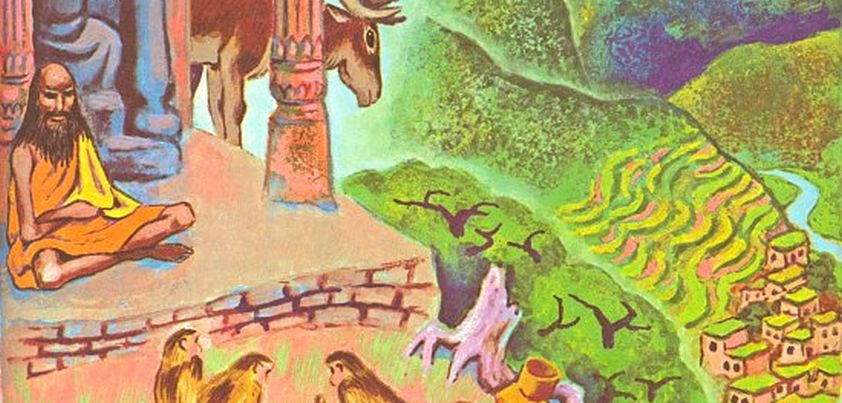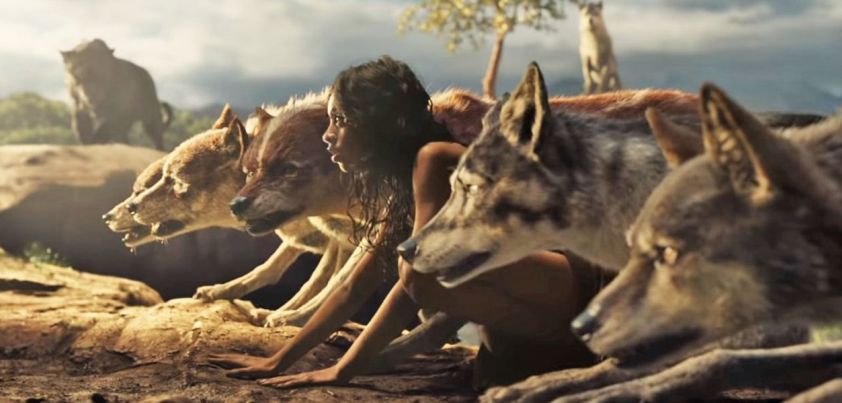 This story from Rudyard Kipling’s Second Jungle Book is about a high-ranking, British educated, Indian government official who gives up everything he owns and begins a new life as a wandering holy-man. He experiences earthly peace in a mountainside shrine high above a small village, and reverence and permanent peace under a tree on the opposite side of the valley. The story shows how sometimes the Hindu concept of acceptance of one’s fate needs to be countered with an authoritative (Western-style) call to action. Themes: Western vs Hindu values, search for enlightenment, human-animal bonding, spiritualism, faith. More…
This story from Rudyard Kipling’s Second Jungle Book is about a high-ranking, British educated, Indian government official who gives up everything he owns and begins a new life as a wandering holy-man. He experiences earthly peace in a mountainside shrine high above a small village, and reverence and permanent peace under a tree on the opposite side of the valley. The story shows how sometimes the Hindu concept of acceptance of one’s fate needs to be countered with an authoritative (Western-style) call to action. Themes: Western vs Hindu values, search for enlightenment, human-animal bonding, spiritualism, faith. More…
Archives
Mary Postgate
 Set in World War 1, Rudyard Kipling‘s Mary Postgate, can be interpreted in a number of ways, each of which suggests a different reason for the unusual reaction of the protagonist (a prim, proper, middle-aged spinster) to watching the slow, painful death of a seriously injured pilot. Her almost orgasmic physical response and subsequent behavior – a luxurious hot bath before tea – indicate that she found it an uplifting experience. This suggests that her bitterness was directed at not only the enemy, but also other aspect(s) of her life. Themes: the brutality of war, repression, loss, anger, revenge, release. More…
Set in World War 1, Rudyard Kipling‘s Mary Postgate, can be interpreted in a number of ways, each of which suggests a different reason for the unusual reaction of the protagonist (a prim, proper, middle-aged spinster) to watching the slow, painful death of a seriously injured pilot. Her almost orgasmic physical response and subsequent behavior – a luxurious hot bath before tea – indicate that she found it an uplifting experience. This suggests that her bitterness was directed at not only the enemy, but also other aspect(s) of her life. Themes: the brutality of war, repression, loss, anger, revenge, release. More…
Mowgli’s Brothers
 The major themes of this children’s story from Rudyard Kipling’s Jungle Book are nature vs. nurture, identity, and respect for the law. When an abandoned “man cub” is adopted by a family of wolves, the wolf parents face two challenges: having the child accepted as a member of the Pack, and protecting him from a crazed tiger who does not follow the “Law of the Jungle”. Things go well until the awakening of the boy’s human reasoning capacity leads to an existential crisis and his eventual expulsion from the Pack. Other themes: abandonment and adoption, family, community, envy, survival. More…
The major themes of this children’s story from Rudyard Kipling’s Jungle Book are nature vs. nurture, identity, and respect for the law. When an abandoned “man cub” is adopted by a family of wolves, the wolf parents face two challenges: having the child accepted as a member of the Pack, and protecting him from a crazed tiger who does not follow the “Law of the Jungle”. Things go well until the awakening of the boy’s human reasoning capacity leads to an existential crisis and his eventual expulsion from the Pack. Other themes: abandonment and adoption, family, community, envy, survival. More…
Mrs. Bathurst
 A major theme of this enigmatic story by Rudyard Kipling is the potential destructive power of love. Interestingly, we never meet the two central characters: Mrs. Bathurst, a New Zealand hotel keeper renowned for her kindness to needy sailors, and “Click” Vickery, a naval warrant officer who once had a serious affair with her. Vickery becomes so obsessed with a cinematograph clip in a traveling circus showing Mrs. Bathurst in London that he deserts his ship and follows the circus to the next town. Other themes include alienation, chance and accident, ambiguity, passion, death and guilt. More…
A major theme of this enigmatic story by Rudyard Kipling is the potential destructive power of love. Interestingly, we never meet the two central characters: Mrs. Bathurst, a New Zealand hotel keeper renowned for her kindness to needy sailors, and “Click” Vickery, a naval warrant officer who once had a serious affair with her. Vickery becomes so obsessed with a cinematograph clip in a traveling circus showing Mrs. Bathurst in London that he deserts his ship and follows the circus to the next town. Other themes include alienation, chance and accident, ambiguity, passion, death and guilt. More…
Rikki-Tikki-Tavi
 The major themes of this famous children’s story from Rudyard Kipling’s Second Jungle Book are duty, loyalty and courage. When viewed from a Western perspective, the story’s motif is the triumph of good over evil. However, as the cobra is a revered Hindu religious symbol, the plot can also be interpreted as an allegory of colonial conquest: the victory of “benevolent” British imperialists (Teddy and his family) and the Indians who support them (Rikki-tikki) over those resisting domination and change (Nag and Nagaina). Other themes: family, the balance of nature, progress and peace under British colonialism.
The major themes of this famous children’s story from Rudyard Kipling’s Second Jungle Book are duty, loyalty and courage. When viewed from a Western perspective, the story’s motif is the triumph of good over evil. However, as the cobra is a revered Hindu religious symbol, the plot can also be interpreted as an allegory of colonial conquest: the victory of “benevolent” British imperialists (Teddy and his family) and the Indians who support them (Rikki-tikki) over those resisting domination and change (Nag and Nagaina). Other themes: family, the balance of nature, progress and peace under British colonialism.